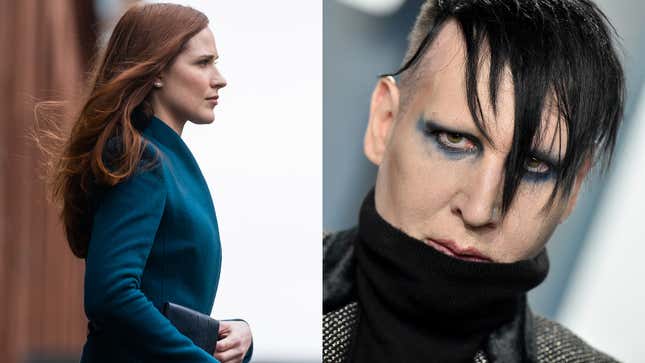The Muddiness of Marilyn Manson’s Attempt to Discredit Evan Rachel Wood’s ‘Phoenix Rising’ Doc
A lawsuit filed earlier this month claims the doc, which just dropped on HBO, is "a one-sided 'documentary.'" Wood begs to differ.
EntertainmentMovies

In no scenario would Phoenix Rising have gone down easy. An HBO documentary cut from the same must-watch-can’t-stomach cloth as 2019’s Leaving Neverland, Phoenix Rising is actor Evan Rachel Wood’s platform for detailing the abuse she says she suffered over the course of her four-year relationship with Marilyn Manson. Phoenix Rising is technically a documentary that roughly spans the year leading up to Wood publicly naming Manson as her abuser (in a 2018 House Judiciary Subcommittee hearing, Wood described abuse but declined to name Manson), but it feels more like a memoir than a proper doc. Wood’s testimony drives the film, and many of its stunning moments are the product of a simple shot of Wood talking directly to the camera. It is arresting in its simplicity by design. A profile of Wood that ran this week in The Cut reported that Phoenix Rising director Amy Berg “didn’t want the doc to feel like a ‘celebrity exposé’ and was relieved when HBO told her an early cut felt like an intimate conversation between best friends.”
In the two-part doc’s first entry, which premiered earlier this year at the Sundance Film Festival, Wood recounts meeting Manson in 2006 when she was 18 and he was 37. Among her claims are those that Manson groomed her, dragged her through a hotel, isolated her from her family, and “essentially raped” her during the filming of his 2007 “Heart-Shaped Glasses” video. In the second part, which premiered this week on HBO, Wood describes being sleep-deprived by Manson, as well as raped in her sleep after he gave her a sleeping pill. She says she suspected at other points that he was dosing her with meth. She recounts being tied up and tortured, at one point being whipped with “a Nazi whip from the Holocaust” while she was tied to a kneeler. She describes ensuing PTSD, a suicide attempt, and death threats from fans after the aforementioned House Judiciary Subcommittee hearing.
Joining Wood onscreen are others who alleged abuse from Manson, among them a former girlfriend named Sarah (no last name given) who says he threatened her with a baseball bat, and another identified as Ashley S., who says Manson fractured her nose during a rape. Also notable is the appearance of Dan Cleary, Manson’s former assistant, who tweeted his support for those speaking out against Manson in September 2020. On camera, he claims he heard Manson saying to his current wife, Lindsay Usich, “I’m going to kill you. I’m going to chop you up and Dan’s gonna bury you in the desert.” Usich notably, posted an apparent message in support of Manson last year on Instagram. They remain married. (Cleary is standing by his words in the doc, per a recent tweet.)
Complicating matters is the defamation lawsuit that Manson filed earlier this month against Wood and Illma Gore. Wood and Gore were collaborators on the formation of the Phoenix Act, a bill proposed to extend the statute of limitations for sexual assault survivors in California. It was passed into law in 2020, albeit in amended form. (Per Wood’s Cut interview, Gore is no longer involved in any Phoenix Act-oriented organization’s activity.) Manson’s complaint reiterates his denial of any wrongdoing and accuses Wood of having “handpicked co-conspirators” to bolster her abuse claims. As of now, 16 women have accused the rock star of abuse, and four have sued for sexual assault. His complaint describes Phoenix Rising as “a one-sided ‘documentary’ premised on the existence of an entirely fictitious federal investigation.” In Phoenix Rising’s second part, however, there is footage of Wood entering an FBI building and, apparently, recounting her abuse (this plays without audio and in slow motion).
-

-

-

-

-

-

-

-

-

-

-

-

-

-

-

-

-

-

-

-

-

-

-

-

-

-

-

-

-

-

-

-

-

-

-

-

-

-

-

-








































